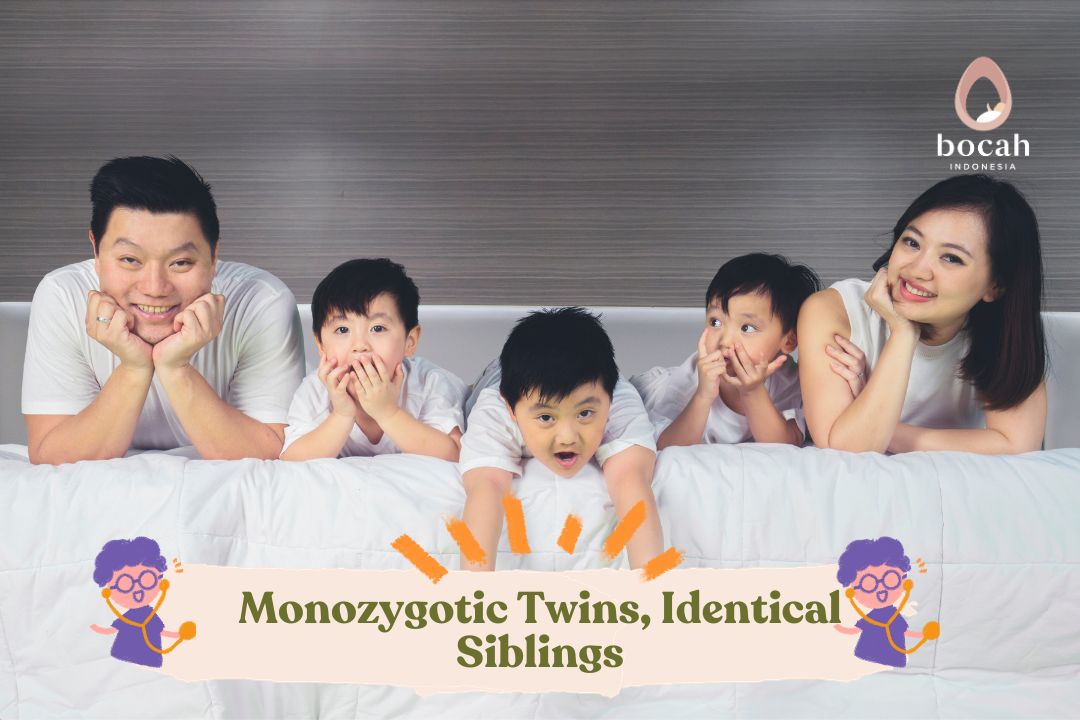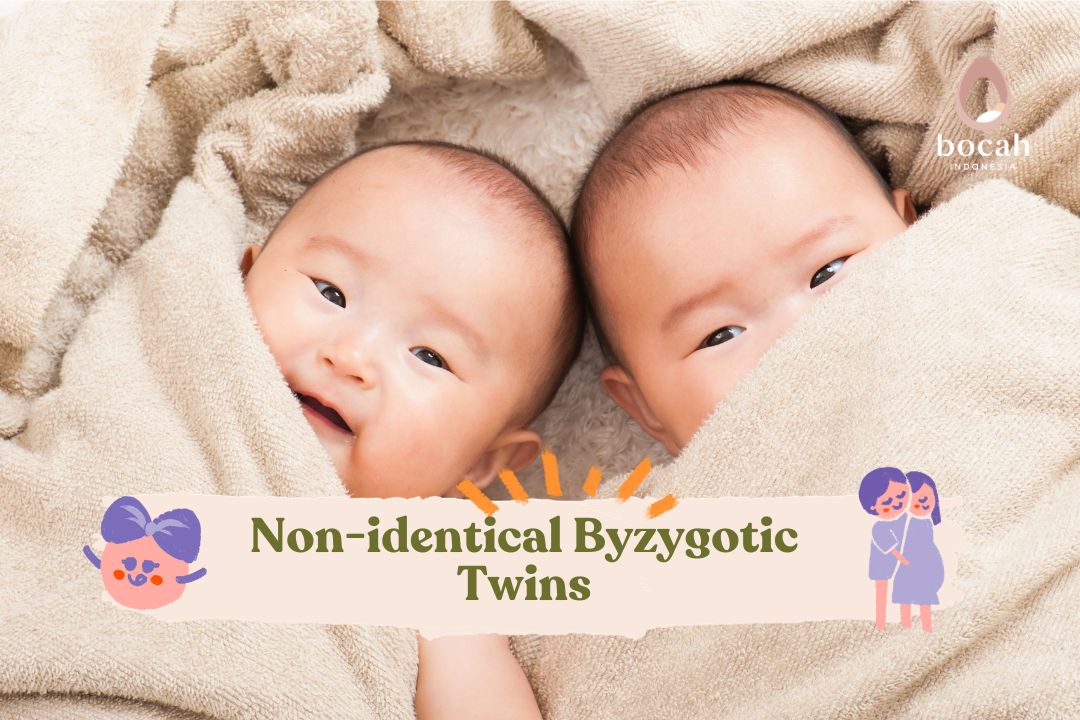Monozygotic Twins, Identical Siblings

Having twins can be a beautiful blessing; learn about monozygotic twins and things Moms need to pay attention to during pregnancy here.
Siblings who look exactly the same are usually referred to as “identical” twins. However, a more accurate term is “monozygotic” or “monozygotic.”
Monozygotic twins share almost exactly the same genes because they are formed from the same embryo. Learn more about monozygotic twins, including how they form and other interesting facts about twins.
What Are Monozygotic Twins?
Identical twins occur when one fertilized egg (an egg that meets sperm) divides into two parts. After that, these two parts grow into two babies that are almost identical.
Tanya Mincah tentang Promil?
This is called monozygotic twins, where “mono” means one, and “zygote” is the term used for a fertilized egg.
In contrast, “dizygotic twins” occur when two different eggs are released and fertilized by two different sperm. Then, these two fertilized eggs grow into two non-identical babies because they have two different eggs as their basis.
Dizygotic twins are more common when Mom and Dad undergo fertility treatments that cause the release of multiple eggs or the transfer of more than one embryo into the uterus.
How Do You Get Monozygotic Twins?
Pregnancy is generally a process that cannot be controlled by parents or prospective parents. Therefore, having monozygotic twins occurs naturally and cannot be requested or predicted.
However, there are some factors that can influence Moms to have a chance of having pregnant monozygotic twins. The factors are as follows:
Heredity: Some families have a history of having monozygotic twins, but this still occurs randomly and cannot be predicted.
Mother’s age: Some studies show that the likelihood of having monozygotic twins slightly increases in Moms who are pregnant at an older age, but this is also not a guarantee.
In Vitro Fertilization (IVF) tube baby: If Moms undergo IVF procedures, there is a slightly higher chance of having monozygotic twins because IVF procedures can cause embryo division.
Alex Robles, a certified obstetrics and gynecology specialist and reproductive endocrinologist and infertility at Columbia University Medical College, cites a small study conducted in Africa, the results of which indicate that a family history of having monozygotic twins can increase the likelihood of couples having them.
However, it is important to remember that there is no guaranteed way to have monozygotic twins. Formation occurs naturally and often cannot be predicted.
If Dad and Mom want to have twins or have specific considerations regarding pregnancy, it is important to talk to a doctor to get accurate information and appropriate advice.
Types of Monozygotic Twin Pregnancies
There are 3 different types of twin pregnancies. These types are determined based on whether the fetuses share a placenta or amniotic sac. Here’s an explanation of each type:
Monochorionic-Diamniotic (Mo-Di)
These identical twins have separate amniotic sacs but share one placenta. This is the most common type of monozygotic twin pregnancy.
Dichorionic-Diamniotic (Di-Di)
These identical twins each have their own amniotic sac and placenta. This type of identical twin pregnancy is associated with the lowest risk for each baby.
Monochorionic-Monoamniotic (Mo-Mo)
This type of monozygotic twin pregnancy is the rarest and riskiest, where identical twins share both the placenta and amniotic sac. Studies show that this type of pregnancy is associated with a survival rate of around 70% for both.
Many doctors even perform a cesarean section around weeks 32 to 34. Risks include umbilical cord attachment and twin-to-twin transfusion syndrome (when one baby receives more blood supply, and the other becomes malnourished).
Treatment for Monozygotic Pregnancy
If Mom is pregnant with identical twins, the pregnancy may be considered riskier than a single-baby pregnancy, regardless of age, physical condition, or previous pregnancy experience. This is because there are more things to monitor, and there is a slight increase in the likelihood of complications.
According to March of Dimes, some risks associated with monozygotic twin pregnancies include:
Premature birth
Preeclampsia
Anemia
Gestational diabetes
Low birth weight
Hyperemesis gravidarum (severe morning sickness)
Placental abruption
Placenta previa
Low birth weight
Birth defects
Miscarriage
Stillbirth
Postpartum hemorrhage
When Mom undergoes a twin pregnancy, all symptoms of pregnancy may be slightly more severe than a regular pregnancy. Mom may feel more tired and nauseous in the first trimester, may gain a little more weight overall, and will experience more pressure on the bladder in the third trimester.
Treatment for monozygotic pregnancy, or identical twin pregnancy, will vary depending on the type of twin pregnancy and Mom’s condition during pregnancy. Here are some treatments that are generally important to consider during monozygotic pregnancy:
Intensive Prenatal Care
In monozygotic twin pregnancy, intensive prenatal care is crucial. This involves regular visits to a doctor or healthcare provider experienced in multiple pregnancies. Typically, Mom will be checked more frequently than a single pregnancy to monitor the development of both babies.
Monitoring of Placenta and Amnion
In monozygotic pregnancy, it is important to monitor the condition of the placenta and amniotic sacs. This is done to ensure that the placenta functions properly and there are no complications such as twin-to-twin transfusion syndrome (when one baby receives more blood supply than the other).
Monitoring of Risks
Monozygotic pregnancy can have specific risks, such as premature birth and preeclampsia. Doctors will carefully monitor signs and symptoms and provide appropriate care if needed.
Delivery
Delivery with monozygotic twins is often scheduled earlier than a single pregnancy to reduce the risk of complications. Delivery via cesarean section (C-section) may be recommended, especially in pregnancies with a higher risk, such as Monochorionic-Monoamniotic.
Post-Delivery Care
After birth, care for identical twin babies will require extra attention, especially if they are born prematurely. They may need to be cared for in the neonatal intensive care unit (NICU) to ensure their health.
It is important to collaborate with the healthcare team, follow the doctor’s advice, and carefully adhere to prenatal care during pregnancy with monozygotic twins. Every pregnancy is unique, and care will be tailored to Mom’s needs.
If Mom and Dad are expecting to have twins, it’s a good idea to consult with a doctor regarding a twin pregnancy program. To get more essential information about fertility, prenatal care, and infertility, read more at Bocah Indonesia.
Source:
- Xue, Y., Li, K., & Zhang, S. (2020). The Effect on Twinning Rate of Transferring Double Vitrified-warmed Embryos in Women of Advanced Reproductive Age: A Retrospective Study. Peer Reviewed Journal, 8, pp. e8308.
- National Health Services UK (2019). Pregnancy. Pregnant with Twins. Diakses 2023.
- National Institute of Health (2022). MedlinePlus. Is The Probability of Having Twins Determined by Genetics?. Diakses 2023.
- U.S. Department of Health & Human Services (2021). Office on Women’s Health. Twins, Triplets, and Other Multiples. Diakses 2023.
- Marcin, A. Healthline (Update 2023). Seeing Double: How to Increase Your Chances of Having Twins. Diakses 2023.
- Gurevich, R. Verywell Family (2021). What are My Chances of Having Twins?. Diakses 2023.
- 4 Herbal Medicine to Improve Male Fertility - 01/07/2025
- 7 Signs of PCOS Every Woman Should Know - 30/06/2025
- Ultimate Guide: Boosting Egg Quality for a Healthy Pregnancy Journey - 23/06/2025



